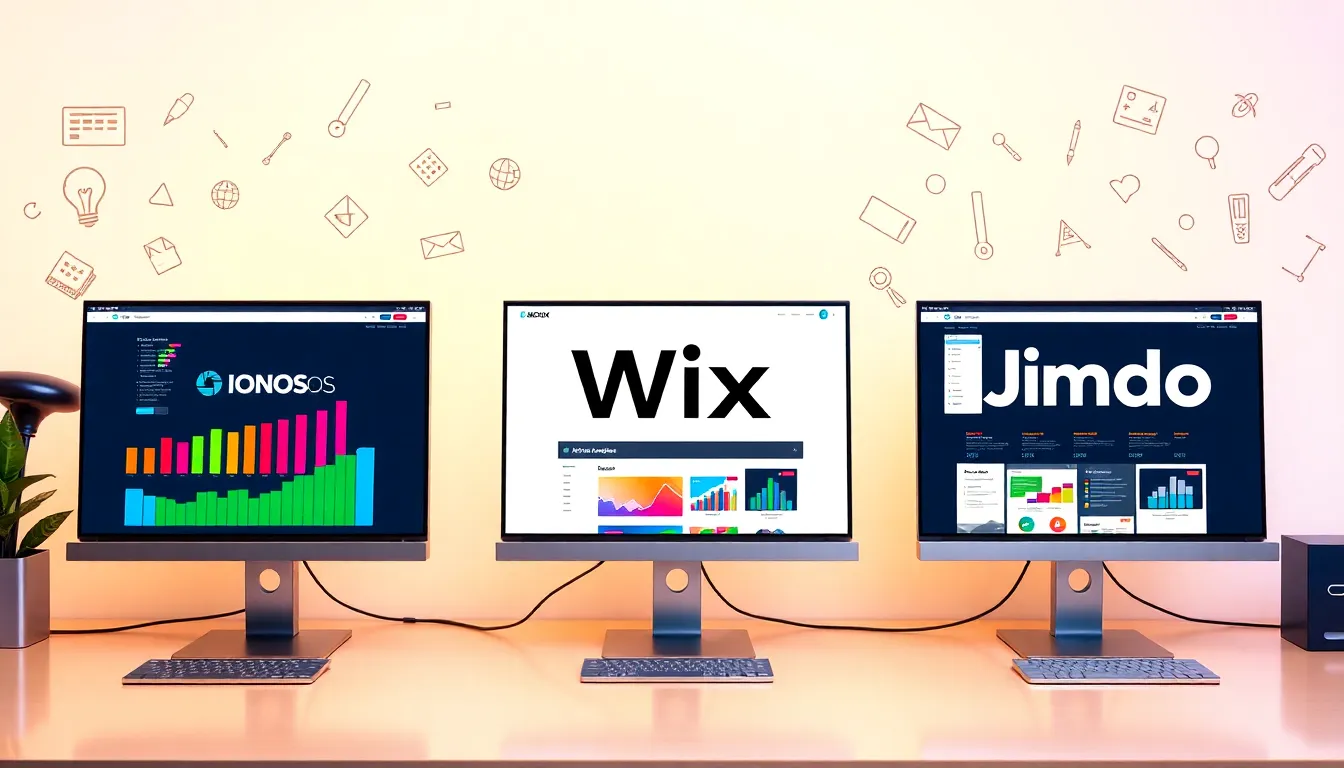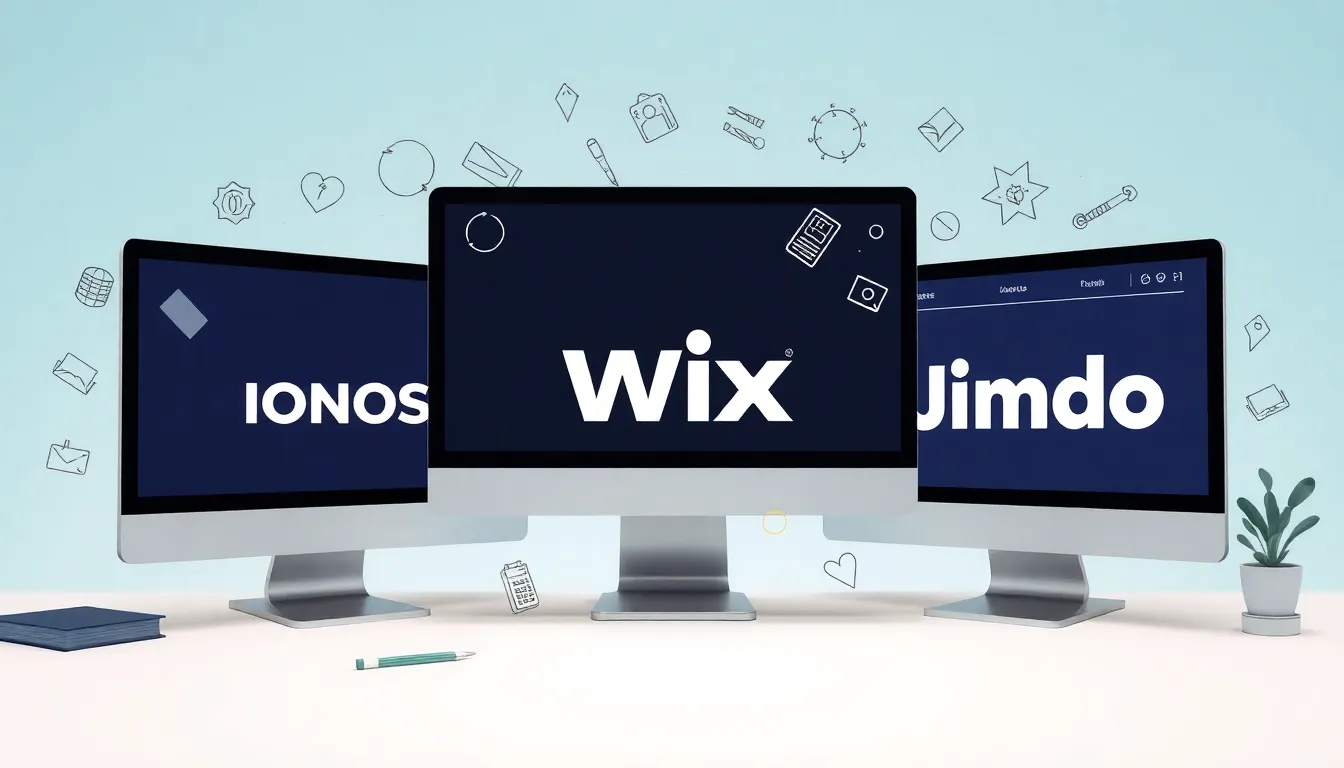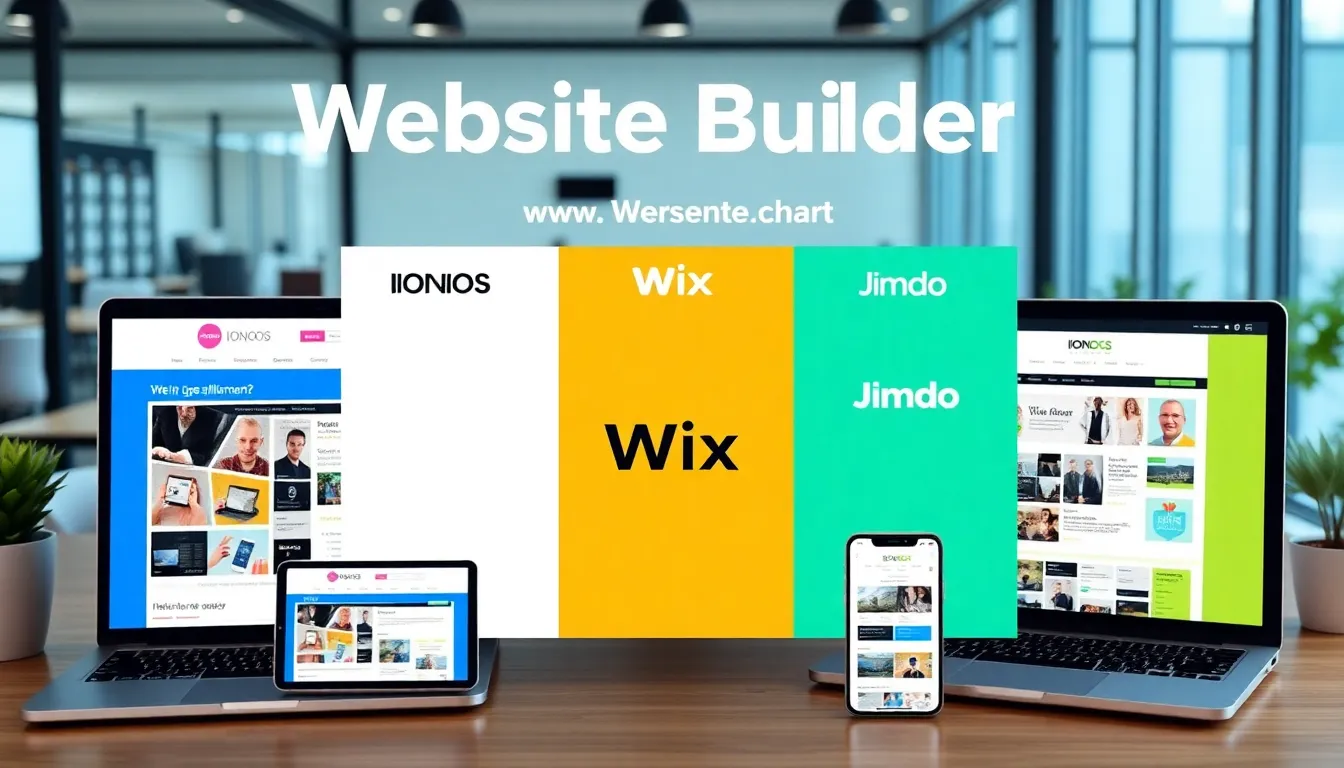Whoever has a free website With IONOS, Wix and Jimdo, you have three tried-and-tested platforms to choose from, which differ in terms of ease of use, design flexibility and range of functions. This comparison shows you in an easy-to-understand way which modular solution is right for your online project - whether for your local business, portfolio or a private blog.

Key points
- User friendlinessAll three kits also allow beginners to get started.
- Design flexibilityWordPress at IONOS offers the most design freedom.
- SEO toolsWix scores with an integrated optimization system.
- Data protectionIONOS and Jimdo rely on German server locations.
- Cost structureThe basic version is free with all providers - with restrictions.
IONOS with WordPress - Maximum control for demanding users
IONOS stands out through its connection with WordPress from other providers. This gives you access to a huge library of free themes and plugins. If you already have experience with WordPress or are willing to familiarize yourself with it, you can use it to create highly individual designs. Thanks to AI-supported setup, getting started is also quicker than you would expect from WordPress.
Data protection is particularly attractive: the Server locations are located in Germany - this offers an advantage over providers with pure cloud architecture in other countries. Even if a fee-based upgrade is required for individual domains and larger projects, the basic tariff gives you enough leeway for testing.
For more experienced users who are interested in a detailed IONOS comparison, this Comparison with Strato also helps you choose the right hosting provider.
Wix - Intuitive modular system with a strong design focus
Wix is often considered a favorite for beginners - and not without reason. A Simple drag-and-drop principleThe wide range of templates, over 800 design templates and a smart setup with artificial intelligence make it possible for almost anyone to launch an attractive website in just a few hours. The variety of templates is particularly helpful for artists, freelancers or small stores.
A big plus: Wix's integrated SEO tool guides users step by step through the most important measures. Meta descriptions and page titles can be edited without specialist knowledge. In addition, a performance dashboard provides an overview of page views and loading times.

Jimdo - Fast online access for simple websites
Jimdo is primarily aimed at users who are not interested in technology. With just a few clicks, the Website online - including a legally compliant legal notice, GDPR generator and mobile optimization. Jimdo also uses AI to help create the website. It queries specific information about the industry and goals and uses this to create a rough basic structure.
While the range of designs is manageable, it is usually perfectly adequate for simple business websites, local services or personal blogs. Compared to IONOS or Wix, Jimdo is somewhat more limited, but also less complicated. If you're looking for standard layouts, you'll get there very quickly with Jimdo.
The biggest plus point for many remains the server structure in Germany, including support in German. This creates additional trust - especially for small companies or solo freelancers.
What functions do you get with the free plan?
All three website builders offer a free entry option. However, the services included differ significantly in some cases.
| Platform | Storage space | Advertising visible | Own domain | Design diversity |
|---|---|---|---|---|
| IONOS with WordPress | 1 GB+ | No | Chargeable only | Very extensive |
| Wix | 500 MB | Yes, Wix logo | Chargeable only | Large selection |
| Jimdo | 2 GB | Yes, Jimdo branding | Chargeable only | Limited |

How do you make the right decision?
First think about how much creative freedom you need. Is your focus on individual designyou should look into IONOS and WordPress. If ease of use is important to you, Wix impresses with its intuitive interface. If you love simplicity and are based in Germany, Jimdo is an interesting option.
Another point to consider is the target group of your website: Commercial websites benefit from clear structures, hobby projects need more creative design options. You should also pay attention to storage space and loading times - especially if you want to include image or video material.
If you would like to find out more about getting started with your own online projects, this guide to Tips for launching a website.
SEO, mobile optimization & support in comparison
Especially with free providers, many people ask themselves: How good is the visibility on Google? Wix does well here, thanks to its integrated SEO tool and automatic mobile optimization. Jimdo also adapts your site for smartphones, but leaves less scope for detailed optimization. IONOS, on the other hand, offers all the possibilities with WordPress - but requires some know-how.
Mobile-friendliness is no longer an extra, but a basic requirement for a good ranking. Another factor is loading speed: static systems such as the building blocks from Wix and Jimdo perform better here than customized sites from IONOS.

Who offers long-term advantages?
While all three providers let you start for free, your choice will depend on the functions you need later on. As soon as you want to use your own domain, you will need a paid package with all providers. The prices differ slightly here: Jimdo starts at around €9/month, Wix at around €10/month, while IONOS lets you get started with hosting plans with WordPress integration from as little as €4/month.
A tip: Test the free version extensively first and upgrade when you realize that you need more functionality. Especially for long-term projects, it is worth taking a look at the memory, technical development and expansion options.
In some cases, a permanently free web space ideal for simple pages and mini-projects.

E-commerce capabilities in comparison
Increasingly, small companies and the self-employed not only want to be present, but also want to be directly Selling products or services online. This is where the three providers differ significantly in some cases. Although all three platforms offer fee-based upgrades for e-commerce functions, the implementation is different:
- IONOS (WordPress)Special e-commerce plugins such as WooCommerce allow you to integrate practically any store system based on WordPress. This is very powerful, but requires a little more technical understanding. In return, you gain maximum flexibility with payment methods or individual product pages. For example, you can access certain industry plugins, from restaurant ordering systems to ticket sales for events.
- WixWix Stores: The modular system offers its own store system called Wix Stores, which is particularly suitable for smaller stores. Here you get visual product management, connection to common payment providers and, in higher tariffs, also voucher and discount functions. This is ideal for freelancers or smaller labels who want to get started quickly.
- JimdoJimdo's integrated online store is very simple, but covers the most important functions. If you only want to offer a few products or are looking for an uncomplicated ordering option, Jimdo is usually sufficient. However, special extensions are limited, so major growth can be difficult.
To summarize: If you want to get started quickly and don't need a highly complex system, Wix and Jimdo are sufficient. If you want a scalable store system with lots of features and extensions, IONOS with WordPress is the better choice in the long term.
Marketing tools and integrations
No matter how beautiful a website may be - without the right Marketing functions it will hardly reach any visitors. Of course, each system offers its own tools, but the scope varies:
- IONOS (WordPress)Here you have access to countless plugins, from newsletter systems to complex CRM connections. You can also easily integrate marketing tools such as Google Analytics or Facebook Pixel. If you invest a little training time, you will be rewarded with a wealth of possibilities - ranging from email campaigns to automated funnel tools.
- WixThe SEO assistant mentioned above is just one example of the integrated marketing functions. There is also the option of using social media feeds, event planners or newsletter tools directly. Thanks to the intuitive interface, you hardly notice that you are setting up advanced marketing campaigns.
- Jimdo: Newsletter integration and basics for social media links are also available here, but you are tied to the predefined interfaces. Some advanced tools have to be added via external applications, but this is usually sufficient for beginners to generate their first visitors.
If you value comprehensive marketing options and are prepared to invest a little more training, the WordPress system at IONOS a strong choice. In the other construction kits, the functions are a solid part of the platform and easier to use, but with less depth.

Multilingual websites
If you are active in several countries or simply want to offer content in two languages, you should consider the topic of Multilingualism cannot be overlooked. The construction kits also differ here:
- IONOS (WordPress)Thanks to special plugins such as WPML or Polylang, any number of languages can be integrated. However, these extensions are often subject to a charge, but are worthwhile for professional websites.
- Wix: It is relatively easy to create additional language variants in the Wix editor. They are managed via the integrated language function. The system also recognizes automatic translations, but you should rely on manual translations for precise content.
- JimdoJimdo: You can create multiple pages and separate them by language, but there is no real multi-language plugin or automatic language switching. Jimdo is therefore less recommendable for websites with many international visitors.
To summarize: For professional multilingual projects, it is worth working with WordPress or at least using Wix, while Jimdo is absolutely sufficient for simple, monolingual websites.
Security and legal compliance
Whether you run a private website or a business website - Data protection and security are playing an increasingly important role. Here too, providers have different focuses:
- IONOS (WordPress)You have access to security plugins, SSL certificates and regular updates. However, you are partly responsible for carrying out these updates yourself or setting up the automatic functions accordingly. The advantage: You can customize security measures very individually.
- WixWix takes care of the basic security in the construction kit. SSL is automatically included and updates are carried out by the system. Additional configurations are in the hands of Wix itself, which is a bit more controlled, but also less flexible.
- JimdoAs already mentioned, Jimdo scores with German servers and relieves you of a lot of legal work, for example through integrated legally compliant imprint and data protection features. However, you can't add complex security features yourself - Jimdo takes care of that.
If you need a particularly high standard of data protection or have a lot of extra security requirements, German-based providers (IONOS, Jimdo) are a good choice. In the end, however, the Cooperation of the userby installing regular updates and making the necessary settings.

Customer service and community
For beginners in particular, it is important to know how well the Support works. Because nothing is more frustrating than not getting anywhere when problems arise. The three systems offer different approaches here:
- IONOSFor hosting and WordPress problems, you can access both telephone support and live chat. In addition, the WordPress community is huge, so you can find countless resources, tutorials and forums on the Internet for every conceivable question.
- WixWix's official support is mainly via email and scheduled phone callbacks, which works very well. There is also an impressive knowledge base and a forum for exchanging information with other users.
- JimdoAt Jimdo you benefit from a German-speaking support team. Contact takes place via email. A live chat is not always available, but Jimdo scores with a clearly structured help page and a community-oriented Facebook group where users can give each other tips.
Bear in mind that with WordPress-based solutions such as IONOS, the official help for the CMS itself is extensive, but sometimes challenging for technical beginners. Wix and Jimdo are somewhat more accessible in this respect, because the support is aimed precisely at the respective construction kit.

Scalability and performance
Not everyone who creates a free website sticks with a small project. Maybe you want to grow later, publish more content or expand a store. In terms of Scalability should therefore think long-term:
- IONOS (WordPress)The system can theoretically handle up to millions of visitors per month, provided you choose the right hosting packages. You can cache plugins so that your pages load quickly and book additional server resources if your project grows rapidly.
- WixWix is well positioned for medium-sized websites with several hundred subpages. The server infrastructure is solid. However, limitations can arise with very large or data-intensive projects, especially if you want to host a lot of media such as videos.
- JimdoPerformance is sufficient for simple sites and even small online stores. However, if you get a lot more visitors or want to upload very complex content, Jimdo will quickly reach its limits. In this case, a move to a more powerful system or an upgrade would be advisable.
With regard to the Performance all three solutions can be convincing as long as the project fits the scope of services. However, if you decide on a really large online portal, a WordPress solution from IONOS is usually the most flexible choice because you can book more hosting packages and additional features.
Design adjustments and individualization
With regard to the Layout we have already mentioned the scope for design, but details play a role, especially for advanced users. Whether you can embed your own fonts, customize CSS or insert JavaScript code can be limited or very open, depending on the construction kit:
- IONOS (WordPress)Here you can freely customize CSS, JavaScript or entire themes and even program your own templates. If you are really creative, you will find unlimited possibilities. However, the sheer mass of freely available themes can be overwhelming.
- WixThe visual editor offers plenty of scope - you can finely position elements and choose your own colors or fonts. However, in-depth coding is only possible in conjunction with the Wix Velo developer platform. This is aimed more at advanced users.
- JimdoThe predefined layouts are modern, but you only have limited options for intervening in the code. On the other hand, there are no typical complications or sources of error that could arise from your own coding. However, if you want to integrate a few color adjustments and a logo, you will be adequately served.
Especially the Balancing freedom and simplicity often determines which kit you choose. Sometimes less is more, especially if you don't intend to do a lot of coding. But if you're looking for maximum individuality, you'll hardly reach any limits with WordPress.

My overview of the comparison of IONOS, Wix & Jimdo
All the construction kits in the comparison have their own strengths: With WordPress at IONOS you get maximum possibilities - particularly interesting for professionals or users who like to experiment. Wix requires no prior knowledge, offers many designs and scores with its SEO function. Jimdo impresses with its quick setup, German infrastructure and uncomplicated operation.
This is how I would decide: If you want more flexibility and want to implement your own ideas, IONOS is the right choice. Creative beginners with a design focus are best off with Wix. If you want to keep things simple and need your site to be purely informative, Jimdo is a time-saving way to get started - especially in German-speaking countries.



